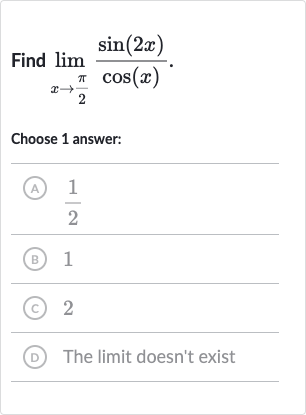Full solution
Q. Find .Choose answer:(A) (B) (C) (D) The limit doesn't exist
- Identify Limit: Identify the limit that needs to be evaluated.We need to find the limit of the function as approaches .
- Direct Substitution: Direct substitution to check if the limit can be evaluated directly.If we substitute directly into the function, we get . Since and , we have an indeterminate form of . This means we cannot find the limit by direct substitution.
- Apply L'Hôpital's Rule: Apply L'Hôpital's Rule to evaluate the limit. L'Hôpital's Rule states that if the limit of functions and as approaches a value is an indeterminate form or , then the limit of as approaches is the same as the limit of their derivatives , provided this limit exists.
- Differentiate Functions: Differentiate the numerator and denominator.The derivative of with respect to is , and the derivative of with respect to is .
- Apply Derivatives: Apply L'Hôpital's Rule using the derivatives.Now we need to find the limit of as approaches .
- Substitute Values: Substitute into the derivatives.Substituting into the derivatives, we get . Since and , the expression simplifies to which equals .
- Conclude Limit: Conclude the limit.The limit of as approaches is .

